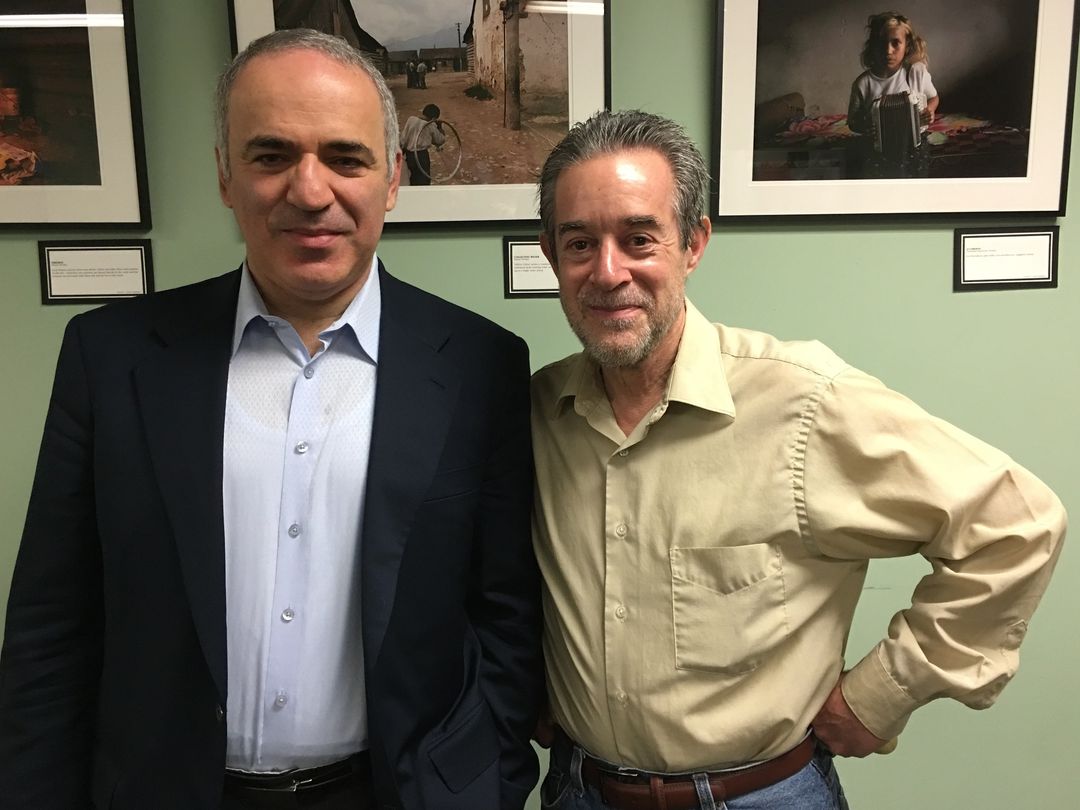I remain on my break from baseball writing, but I read a piece this week that was so eloquent that I want to share it with the Hot Stove Village.
The piece was written by Dan Margolies, a long-time Kansas City journalist who since 2014 has been a familiar voice on KCUR, KC’s NPR affiliate. Or as Dan likes to say, he has a face made for radio.

Today is Dan’s last day at KCUR. He is retiring, and earlier this week, he posted his retirement message. It’s beautifully written.
A little background. Dan became part of the Kansas City journalism scene in 1984 when he signed on as one of the first reporters for the newly established Kansas City Business Journal. His beat was banking and real estate, so I often crossed paths with him because my law firm was active in those areas. He was known for his investigative abilities and knowledge of the law (he was a lawyer before pursuing his passion for journalism).
In 2000, Dan moved his talents to the business pages of the Kansas City Star. He left the Star in 2009 for an assignment with Reuters in Washington DC. In 2014, he joined the news staff at KCUR.
I have the pleasure of often meeting with Dan and our mutual friend Jim Fitzpatrick to talk about the world. Politics, history, books, culture, media, religion, Hebrew (Dan is fluent), crossword puzzles (Dan is fluent), trivia (again, Dan), music (Dan, classical; me, rock ‘n’ roll; Jim, both), jokes (mostly Dan, with a Yiddish flair), Seinfeld, critiquing Fitzpatrick’s JimmyC column when Dan or I think he’s off-base, and on and on.
Sometimes we talk about baseball. Downtown stadium (I’m pro and nudging them). Need for better Royals TV coverage. Dan’s favorite all-time player is Willie Mays, no doubt influenced by his father Rabbi Morris Margolies who was a Giants fan in the Bronx before moving to Kansas City. Why not the Yankees or Dodgers? In the 1930s, when Morris was a boy, the Giants were the only New York team with Jewish players.
There is one issue that has full agreement in our talks. Election denialism (a/k/a the Big Lie) is a blemish on our country. Much of Dan’s retirement message is devoted to this subject, and he plans to use some of his retirement time to help salvage what he calls our “teetering democracy.”
Coincidentally, the Hot Stove posted earlier this week was about a positive example of democracy from 50 years ago (Mike White’s one-vote victory in 1972). In that 1972 election, two honorable candidates worked with bipartisan election officials to get the right count. This concept was mostly routine in elections until the Big Lie was fabricated in 2020. Election denialism carried over as a heated issue in the 2022 midterms, but with some rare exceptions, losing candidates accepted the results.
But the Big Lie still hangs like a cloud over the country. With Dan and others on the case, maybe election denialism will return to the fringe of politics by 2024.
Now, here’s Dan…

[November 30, 2022] I turn 70 years old today, an age at which I’d always resolved to retire. So though I love my work and my colleagues at KCUR, I’m doing just that. I want to spend more time with my grandkids, more time reading, more time traveling and more time doing my small part to help salvage our teetering democracy.
It’s been quite the journey. I began as a starry-eyed journalist, hoping that when I left the stage the world might be a slightly better place than when I ascended it. Little did it occur to me that facts would one day be seen as fungible, that evidence, logic, expertise and reason would no more carry the day than any random fool’s baseless and fact-free opinion. I wouldn’t say I’ve become a cynic, but I’ve certainly come to see that marshalling and contextualizing the facts – the essence of the work we do as journalists – is, while all-important and necessary, no longer sufficient.
I was a philosophy major in college, and one of my favorite little philosophy stories is about how Samuel Johnson proceeded to dismiss as absurd and untrue the philosopher George Berkeley’s theory of subjective idealism, which held that reality depends on our perceptions of the world. Here’s how Johnson’s biographer James Boswell put in his immortal “The Life of Samuel Johnson”:
“After we came out of the church, we stood talking for some time together of Bishop Berkeley’s ingenious sophistry to prove the non-existence of matter, and that everything in the universe is merely ideal. I observed, that though we are satisfied his doctrine is not true, it is impossible to refute it. I never shall forget the alacrity with which Johnson answered, striking his foot with mighty force against a large stone, till he rebounded from it, ‘I refute it thus.’”
The point of the story being that there are matters that our perceptions of reality share in common. Or so I naively thought. The last few years, with its eruptions of election denialism, Covid conspiracy theories, QAnon madness and blithe disregard for the hard-won discoveries of science, have demonstrated otherwise. Confronting true believers with the facts merely causes them to double down on their reality-denying crackpottery.
As New York Times writer Frank Bruni put it in his newsletter a few weeks ago, “If enough Americans exalt feelings over facts, insist on their preferred version of events rather than the actual one, refuse to subjugate their personal wants to any public good and reject the processes and institutions that enable group decisions, we have chaos. We all lose.”

So what is to be done? I’m not sure I have any answers, other than we have no choice but to keep telling the truth as best we can in the hope, however faint, that at least some of these people are persuadable.
I take strange comfort in knowing that it has always been thus – that people have always been susceptible to bouts of mass hysteria and delusion. In 1710, Jonathan Swift wrote: “Besides, as the vilest Writer has his Readers, so the greatest Liar has his Believers; and it often happens, that if a Lie be believ’d only for an Hour, it has done its Work, and there is no farther occasion for it. Falsehood flies, and the Truth comes limping after it; so that when Men come to be undeceiv’d, it is too late; the Jest is over, and the Tale has had its Effect…”
If that was true more than 300 years ago, how much more so is it the case today given our ability to transmit misinformation to all corners of the world in the blink of an eye. I recently read a remarkable book titled “Memoirs of Extraordinary Popular Delusions and the Madness of Crowds.” It was written in 1841 by a Scottish journalist named Charles Mackay and it chronicles some of the spectacular delusions to which people over the centuries have fallen prey. Among the mass delusions covered by Mackay are the Dutch tulip mania of the early 17th century, the witch trials of 16th and 17th century Europe and America, and the Crusades. “We find that whole communities suddenly fix their minds upon one object, and go mad in its pursuit; that millions of people become simultaneously impressed with one delusion, and run after it, till their attention is caught by some new folly more captivating than the first,” Mackay wrote.
I suppose the best we can hope for is to keep chipping away at the margins – and maybe that will suffice to preserve some residuum of sanity in a world otherwise gone mad. An oft-quoted aphorism by the first-century Jewish sage Rabbi Tarfon states, “It is not your duty to complete the work, but neither are you free to desist from it.” And indeed, we don’t have the luxury to desist from doing the work; for in the words of Rabbi Tarfon’s contemporary, Rabbi Hillel, “If I am not for myself, then who will be for me? And if I am only for myself, then what am I? And if not now, when?”
For those wondering about the photo below of Garry Kasparov and me, it was taken at KCUR seven years ago. Why this photo? Because Kasparov, I think, epitomizes what I’m talking about: rather than revel in the fame and adulation he earned as one of the greatest chess players of all time, he chooses instead to pursue the life of a pro-democracy activist who does the hard and often thankless work of trying to rouse the world from its dogmatic slumber. “When the Cold War was won back in 1991, we forgot a simple thing, that evil doesn’t die,” he told NPR’s Scott Simon earlier this year. “It grows back through the cracks of our apathy.”
Kasparov should inspire all of us. We can’t let apathy, ignorance, stupidity and hate win. So while I’m hanging up my journalism spurs, I still hope to wage the good fight. I’m retiring, but I have no intention of sitting on the sidelines.
Finally, to all of the readers and listeners who put up with me these last four or so decades, and to all of the sources who trusted me to be honest, fair and factual, I thank you. Whatever I may have accomplished in my nearly 38 years as a journalist, I could not have done it without you.

Dan’s Farewell Interview: On Wednesday this week, Dan gave his farewell interview on Steve Kraske’s Up to Date. It’s worth a listen as Dan discusses his career and gives details on how he broke some big stories. Click here (22 minutes).
Lonnie’s Jukebox – Dan Margolies Edition: I emailed Dan to ask if he would like to pick out some tunes for Lonnie’s Jukebox, maybe even include a couple of short classical favorites. His first response ignored the tunes part, and his list of classical favorites were all long pieces: Bach’s Cello Suite No. 4, Mozart’s String Quintet No. 3 in C major, Schubert’s song cycle “Die Winterreise,” Samuel Barber’s “Knoxville: Summer of 1915,” and Shostakovich’s Piano Trio No. 2.
His list would of course be suitable for his other public radio gig at KCUR’s sister station, Classical KC at 91.9. On Thursday nights from 8 to 10 PM, Dan and Kansas City Symphony Director Michael Stern provide commentary while playing classic concerts by the KC Symphony (photo below). The show is repeated on Sundays from 4 to 6 PM. Past shows are archived here. Dan will be continuing his work on this show.

I patiently explained to Dan that I was looking for something a little less time consuming for Hot Stove readers. Within minutes, he sent me another list. To say it is eclectic may be an understatement.
“Avinu Malkeinu” by Barbra Streisand (1997). Hebrew for “Our Father, Our King.” I’m sure Dan knows the words of this Jewish prayer. He frequently serves as a cantor in Kansas City synagogues.
“The Ballad of Harry Lewis” by Allan Sherman (1962). Dan says this song has given him immense pleasure since he first heard it when he was about 10 years old.
“Talking Vietnam Potluck Blues” by Tom Paxton (1968). Sitting around the campfire in Vietnam. “I took a whiff as a cloud rolled by/And my nose went up like an infield fly…Well I may be crazy, but I think not/I’d swear to God that I smell pot.”
“The Elements” by Tom Lehrer (1959). The lyrics recite the names of all chemical elements known at that time (102). Sung to the tune of the “Major-General’s Song” from The Pirates of Penzance by Gilbert and Sullivan.

“You Want It Darker” by Leonard Cohen (2016). This was the title track on an album released 17 days before Cohen died in 2016. Leonard Cohen is where the musical tastes of Dan and Lonnie are in alignment. But I would have picked a different song in honor of Dan’s retirement. So I’ll play it too. “Closing Time” (1992).
“Both Sides Now” by Judy Collins (1967). Written by Joni Mitchell, this became a signature song for Judy Collins. Several years ago, Rita and I had the pleasure of seeing Judy Collins sing this song at a Planned Parenthood fundraiser in Kansas City.
“Fantasia on a Theme by Thomas Tallis” composed by Vaughn Williams (1910). When I asked Dan if he and his wife Deborah had a song from their dating years, he came back with this classical piece. He said it was short. I went to Google and found way too many options, ranging from 2 to 17 minutes. The one I linked is the short one, but if you want the full treatment, Dan suggests the one at this link (14:15). Below, Dan and Deborah’s wedding photo from 39 years ago.

Enjoy your retirement Dan. And your quest for democracy. I know your voice will still be heard.